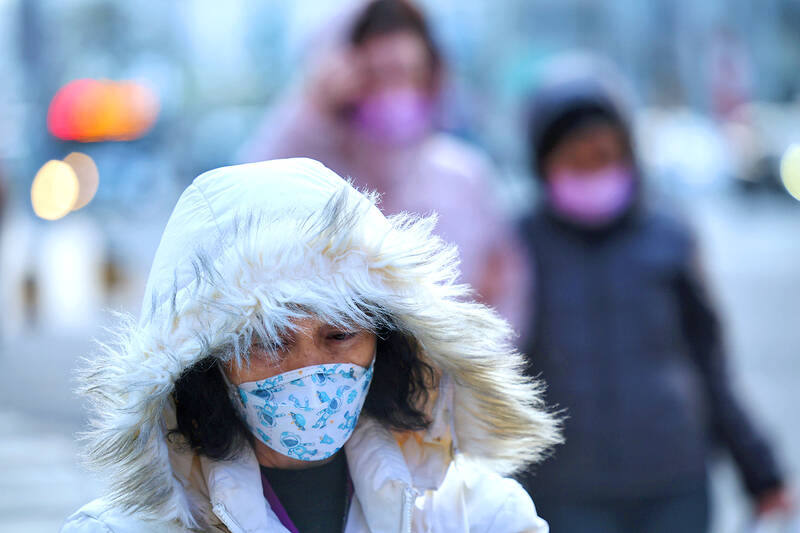On the question of whether “low-temperature leave” is possible for workers, the Ministry of Labor yesterday said that if employers do not take care of their employees according to its “work guidelines,” they could be fined up to NT$150,000.
Weather forecasts have said a cold wave would sweep southward from today, with temperatures dropping to lows of about 5°C in some flatland areas between Tuesday and Thursday.
The forecasts are reminiscent of the cold wave of January 2016, in which 12 schools nationwide suspended classes. The latest weather forecast has sparked public discussions over whether taking “low-temperature leave” would be possible.

Photo: CNA
The ministry yesterday said the “typhoon leave” people are accustomed to — where work and classes are canceled due to a typhoon — is not stipulated in the Labor Standards Act (勞動基準法). However, the Operation Regulations on the Suspension of Offices and Classes in Times of Natural Disasters (天然災害停止上班及上課作業辦法) stipulate that the matter is at the discretion of local governments, although the suspension of work technically applies only to government agencies as it would be impractical for all sectors of the economy to suspend operations during a typhoon.
However, if workers have “safety concerns” due to strong winds and heavy rain and cannot go to work, and government agencies are under work suspension, they should be considered as having justifiable reasons, and their employers “should not be harsh on them” or give them “unfavorable treatment,” the ministry said.
Regarding “low-temperature leave” or “high-temperature leave,” whether they can be deemed “natural disasters” remains to be discussed, it added.
However, the ministry’s Occupational Safety and Health
Administration has stipulated health and safety guidelines for working outdoors in cold weather, and employers are requested to ensure measures are put in place to ensure their employees are kept warm, especially paying attention to middle-aged and older employees’ health conditions and preventing hypothermia.
The administration said working in extreme cold weather could cause occupational incidents of heart or cerebrovascular diseases, and according to the Occupational Safety and Health Act (職業安全衛生法), employers are required to prepare three major safety and hygiene measures for outdoor work, including in construction projects, exterior wall cleaning, sign hanging, wire maintenance, delivery, agriculture and fishing.
In administrative management, they must remind workers to wear cold-resistant clothing, arrange sufficient rest time, provide hot drinks and establish a mutual protection mechanism among working partners.
In health management, workload and delegation should be appropriately adjusted according to the workers’ health conditions, exposure to cold weather should be reduced as much as possible and attention should be paid to the needs of elderly workers and workers with cardiovascular disease or other underlying health conditions, and medical assistance should be immediately sought when necessary.
In education and training, employers should hold low-temperature healthcare and safety and hygiene education training for their employees, teaching them how to prevent hypothermia and follow healthy and safety procedures, to reduce the risk of harm caused by low temperatures.
The ministry said employers should refer to the guidelines and prepare measures to help keep employees warm, and if they fail to follow the regulations resulting in harm to their employees by working in low temperatures without proper health and safety measures, they could be fined up to NT$150,000.

The Ministry of Education (MOE) is to launch a new program to encourage international students to stay in Taiwan and explore job opportunities here after graduation, Deputy Minister of Education Yeh Ping-cheng (葉丙成) said on Friday. The government would provide full scholarships for international students to further their studies for two years in Taiwan, so those who want to pursue a master’s degree can consider applying for the program, he said. The fields included are science, technology, engineering, mathematics, semiconductors and finance, Yeh added. The program, called “Intense 2+2,” would also assist international students who completed the two years of further studies in

Former president Tsai Ing-wen (蔡英文) departed for Europe on Friday night, with planned stops in Lithuania and Denmark. Tsai arrived at Taiwan Taoyuan International Airport on Friday night, but did not speak to reporters before departing. Tsai wrote on social media later that the purpose of the trip was to reaffirm the commitment of Taiwanese to working with democratic allies to promote regional security and stability, upholding freedom and democracy, and defending their homeland. She also expressed hope that through joint efforts, Taiwan and Europe would continue to be partners building up economic resilience on the global stage. The former president was to first

Taiwan will now have four additional national holidays after the Legislative Yuan passed an amendment today, which also made Labor Day a national holiday for all sectors. The Chinese Nationalist Party (KMT) and Taiwan People’s Party (TPP) used their majority in the Legislative Yuan to pass the amendment to the Act on Implementing Memorial Days and State Holidays (紀念日及節日實施辦法), which the parties jointly proposed, in its third and final reading today. The legislature passed the bill to amend the act, which is currently enforced administratively, raising it to the legal level. The new legislation recognizes Confucius’ birthday on Sept. 28, the

MORE NEEDED: Recall drives against legislators in Miaoli’s two districts and Hsinchu’s second district were still a few thousand signatures short of the second-stage threshold Campaigners aiming to recall Chinese Nationalist Party (KMT) legislators yesterday said they expect success in 30 out of 35 districts where drives have passed the second-stage threshold, which would mark a record number of recall votes held at once. Hsinchu County recall campaigners yesterday announced that they reached the second-stage threshold in the recall effort against Legislator Lin Szu-ming (林思銘). A total of 26,414 signatures have been gathered over the past two months, surpassing the 10 percent threshold of 23,287 in Hsinchu County’s second electoral district, chief campaigner Hsieh Ting-ting (謝婷婷) said. “Our target is to gather an additional 1,500 signatures to reach